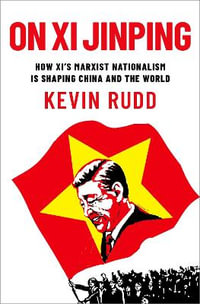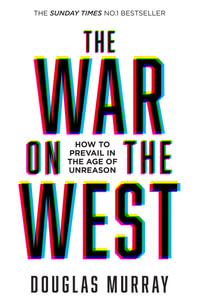
At a Glance
274 Pages
22.86 x 15.24 x 1.47
Paperback
RRP $92.99
$72.75
22%OFF
or 4 interest-free payments of $18.19 with
orAims to ship in 7 to 10 business days
Why have the great revolutionary leaders of modern times-from Robespierre to Lenin and Mao Tse-tung-so often been ascetics, austere "puritans" with few emotional ties? What functions, political as well as personal, do these ascetic traits perform for the modern revolutionary leader and for his followers?
Noted historian and author Bruce Mazlish is convinced that, beginning in the nineteenth century, the needs of modernizing revolutions have produced a distinct new type of political leader, the revolutionary ascetic. This individual's denial of personal pleasures and commitments both enables him to perform politically necessary, if personally repulsive, revolutionary acts, and to command the allegiance of his more worldly followers.
Starting with Cromwell and the religious ascetics of the Puritan Revolution, Mazlish shows, in a series of fascinating personality sketches, how this asceticism first became secularized with the French Revolution and then in the nineteenth and twentieth centuries was put to the service of a new kind of "total" modernizing revolution in Russia, China, and elsewhere. In two remarkably vivid portraits of Lenin and Mao Tse-tung, Mazlish shows us precisely how two of the century's best-known revolutionaries consciously and unconsciously used their personal asceticism to induce revolutionary change.
Industry Reviews
-Mazlish traces the rise of the modern 'professional revolutionary' from his early religious beginnings as 'godlike Legislator' through its early-modern 'Religious Stages, ' 'The Puritan Revolution and Cromwell, ' 'The French Revolution and Robespierre, ' right to the emergence of the Bolshevik and concludes with two elaborate case studies on Lenin and Mao Tse-tung. Mazlish's book is well structures and lucidly argues. To the almost complete exclusion of religion the Revolutionary Ascetic is construed as a secular, basically political, ascetic on ground of psychoanalytic theory.-
--Gert Mueller, Sociological Analysis
-[T]he volume is eminently readable and stimulating. I dare anyone to read it and not succumb to the temptation to rush to the library and check out Weber, Freud, Erik Erikson, James and John Stuart Mill, Bentham, Chernyshevsky, and Lenin.-
--Hendrik Van Dalen, The Journal of Politics
-This book does not claim to be a definitive statement. Yet it combines a salutary historical caution with enough theoretical daring to carry the discussion about personality and revolution to a new stage.-
--Mark N. Hagopian, The American Political Science Review
-Bruce Mazlish draws on Max Weber and Sigmund Freud as his two conceptual fountainheads in an effort to delineate a modern revolutionary type who features a pattern of internal hardness, control, and discipline, as a prerequisite for external certainty and domination of a political movement. Mazlish traces the historical development of religious asceticism with its displacement of the virtues of hard work, energetic activity, and frugality to economic activity. . . . Mazlish has contributed the specific revolutionary contexts of a group of these modern leaders within Weber's vision of the great transformation from 'innerworldly' to a 'worldly' asceticism.-
--Peter Loewenberg, The American Historical Review
-Bruce Mazlish is one of the most prominent and able historians who have chosen to poke about in the murky depths of psychohistory. . . . In The Revolutionary Ascetic, he does not attempt a full psychohistorical profile of his main characters but contents himself with selected observations about their mental states and inner compulsions. . . . Mazlish is a conscientious historian who is fully aware of the pitfalls involved in attempting to shed more light on historical causation by invoking the principles and procedures of psychology and psychotherapy.-
--Bernard Norling, The Review of Politics
-[S]uggestively illuminating.- --Louise Haberman, The Journal of Modern History
-[T]he value of the work lies in such 'human' comprehension of individual leaders as Mazlish is able to generate from his construct.-
--Eugene Victor Wolfenstein, Political Science Quarterly
"Mazlish traces the rise of the modern 'professional revolutionary' from his early religious beginnings as 'godlike Legislator' through its early-modern 'Religious Stages, ' 'The Puritan Revolution and Cromwell, ' 'The French Revolution and Robespierre, ' right to the emergence of the Bolshevik and concludes with two elaborate case studies on Lenin and Mao Tse-tung. Mazlish's book is well structures and lucidly argues. To the almost complete exclusion of religion the Revolutionary Ascetic is construed as a secular, basically political, ascetic on ground of psychoanalytic theory."
--Gert Mueller, Sociological Analysis
"[T]he volume is eminently readable and stimulating. I dare anyone to read it and not succumb to the temptation to rush to the library and check out Weber, Freud, Erik Erikson, James and John Stuart Mill, Bentham, Chernyshevsky, and Lenin."
--Hendrik Van Dalen, The Journal of Politics
"This book does not claim to be a definitive statement. Yet it combines a salutary historical caution with enough theoretical daring to carry the discussion about personality and revolution to a new stage."
--Mark N. Hagopian, The American Political Science Review
"Bruce Mazlish draws on Max Weber and Sigmund Freud as his two conceptual fountainheads in an effort to delineate a modern revolutionary type who features a pattern of internal hardness, control, and discipline, as a prerequisite for external certainty and domination of a political movement. Mazlish traces the historical development of religious asceticism with its displacement of the virtues of hard work, energetic activity, and frugality to economic activity. . . . Mazlish has contributed the specific revolutionary contexts of a group of these modern leaders within Weber's vision of the great transformation from 'innerworldly' to a 'worldly' asceticism."
--Peter Loewenberg, The American Historical Review
"Bruce Mazlish is one of the most prominent and able historians who have chosen to poke about in the murky depths of psychohistory. . . . In The Revolutionary Ascetic, he does not attempt a full psychohistorical profile of his main characters but contents himself with selected observations about their mental states and inner compulsions. . . . Mazlish is a conscientious historian who is fully aware of the pitfalls involved in attempting to shed more light on historical causation by invoking the principles and procedures of psychology and psychotherapy."
--Bernard Norling, The Review of Politics
"[S]uggestively illuminating." --Louise Haberman, The Journal of Modern History
"[T]he value of the work lies in such 'human' comprehension of individual leaders as Mazlish is able to generate from his construct."
--Eugene Victor Wolfenstein, Political Science Quarterly
"Mazlish traces the rise of the modern 'professional revolutionary' from his early religious beginnings as 'godlike Legislator' through its early-modern 'Religious Stages, ' 'The Puritan Revolution and Cromwell, ' 'The French Revolution and Robespierre, ' right to the emergence of the Bolshevik and concludes with two elaborate case studies on Lenin and Mao Tse-tung. Mazlish's book is well structures and lucidly argues. To the almost complete exclusion of religion the Revolutionary Ascetic is construed as a secular, basically political, ascetic on ground of psychoanalytic theory."
--Gert Mueller, Sociological Analysis
"[T]he volume is eminently readable and stimulating. I dare anyone to read it and not succumb to the temptation to rush to the library and check out Weber, Freud, Erik Erikson, James and John Stuart Mill, Bentham, Chernyshevsky, and Lenin."
--Hendrik Van Dalen, The Journal of Politics
"This book does not claim to be a definitive statement. Yet it combines a salutary historical caution with enough theoretical daring to carry the discussion about personality and revolution to a new stage."
--Mark N. Hagopian, The American Political Science Review
"Bruce Mazlish draws on Max Weber and Sigmund Freud as his two conceptual fountainheads in an effort to delineate a modern revolutionary type who features a pattern of internal hardness, control, and discipline, as a prerequisite for external certainty and domination of a political movement. Mazlish traces the historical development of religious asceticism with its displacement of the virtues of hard work, energetic activity, and frugality to economic activity. . . . Mazlish has contributed the specific revolutionary contexts of a group of these modern leaders within Weber's vision of the great transformation from 'innerworldly' to a 'worldly' asceticism."
--Peter Loewenberg, The American Historical Review
"Bruce Mazlish is one of the most prominent and able historians who have chosen to poke about in the murky depths of psychohistory. . . . In The Revolutionary Ascetic, he does not attempt a full psychohistorical profile of his main characters but contents himself with selected observations about their mental states and inner compulsions. . . . Mazlish is a conscientious historian who is fully aware of the pitfalls involved in attempting to shed more light on historical causation by invoking the principles and procedures of psychology and psychotherapy."
--Bernard Norling, The Review of Politics
"[S]uggestively illuminating." --Louise Haberman, The Journal of Modern History
"[T]he value of the work lies in such 'human' comprehension of individual leaders as Mazlish is able to generate from his construct."
--Eugene Victor Wolfenstein, Political Science Quarterly
ISBN: 9781412852982
ISBN-10: 1412852986
Published: 30th January 2014
Format: Paperback
Language: English
Number of Pages: 274
Audience: General Adult
Publisher: Taylor & Francis Ltd
Country of Publication: US
Dimensions (cm): 22.86 x 15.24 x 1.47
Weight (kg): 0.37
Shipping
| Standard Shipping | Express Shipping | |
|---|---|---|
| Metro postcodes: | $9.99 | $14.95 |
| Regional postcodes: | $9.99 | $14.95 |
| Rural postcodes: | $9.99 | $14.95 |
How to return your order
At Booktopia, we offer hassle-free returns in accordance with our returns policy. If you wish to return an item, please get in touch with Booktopia Customer Care.
Additional postage charges may be applicable.
Defective items
If there is a problem with any of the items received for your order then the Booktopia Customer Care team is ready to assist you.
For more info please visit our Help Centre.
You Can Find This Book In

BLACK FRIDAY
RRP $34.99
$25.75
OFF

BLACK FRIDAY
RRP $22.99
$11.50
OFF
This product is categorised by
- Non-FictionPolitics & GovernmentPolitical Structure & ProcessesPolitical Leaders & Leadership
- Non-FictionSociology & AnthropologySociology
- Non-FictionHistorySpecific Events & Topics in HistoryRevolutions, Uprisings, Rebellions
- Non-FictionPolitics & GovernmentPolitical ActivismRevolutionary Groups & Movements
- Non-FictionPolitics & GovernmentPolitical Control & Freedoms





















